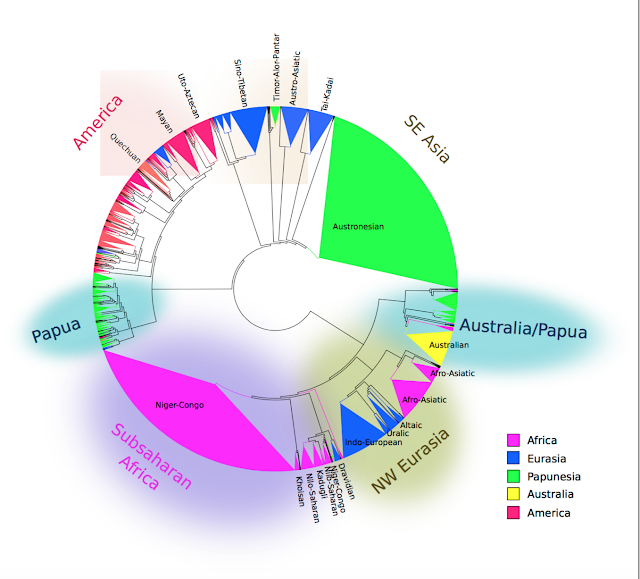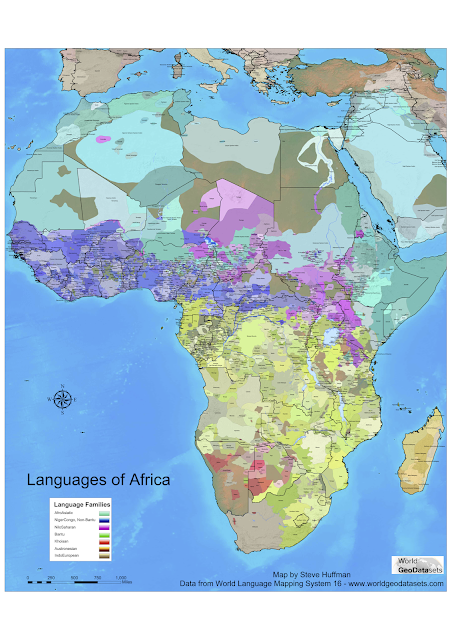WEIRD and LOL-languages
We've heard before about WEIRD languages and communities, i.e Western Educated Industrialised Rich and Democratic. The point of that label is to highlight the fact that much of the research that has been done in the study of human culture (psychology, linguistics, anthropology, sociology etc) is only representative for a small subset of all humans that live on this planet of ours. Most notably there is currently the "Making Science Less WEIRD"-initiative, you can read more about that and other related items here.
Now, prof. emeritus Östen Dahl has come up with a new useful abbreviation: LOL. It stands for Literate, Offcial and with Lots of users. I learned this from reading the abstracts of the last linguistics conference at the dept of linguistics at MPI-EVA. Here is an excerpt from that abstract that explains the motivation behind this term:
I think, however, that we may also be led a bit astray by the catchy acronym WEIRD in that the adjectives it encapsulates are not necessarily the most adequate for characterizing the biases that have influenced linguistics. It is true that Western (mainly European) languages have been in the focus for a long time; however, even after the Eurocentric bias has started to lose its grip on the choice of languages to be studied, there remains a bias that can be summed up in the acronym “LOL” for “Literate, Official, and with Lots of users”. Even in typological works, the bias is visible. (...) It turns out that there is a very restricted set of LOL languages which are overrepresented in almost any sample. It can also be shown that these languages as a group have a distinct typological profile.
Sounds like a very good piece of criticism to me, I'm interested in seeing what's coming next.
Here is some awesome free stuff to read on the topic of WEIRDness, in alphabetical order
Cysouw, Michael (2011a). “Quantitative explorations of the worldwide distribution of rare characteristics, or: the exceptionality of northwestern European languages”. In: Horst Simon & Heike Wiese (Eds.), Expecting the Unexpected: Exceptions in Grammar. Berlin: De Gruyter Mouton. 411-431. [free PDF]
Cysouw, Michael (2011b): “Some more details about the definition of rarity" 437-441. [free PDF]
Dahl, Östen (1990) Standard Average European as an exotic language. In Toward a typology of European languages, ed. by Johannes Bechert, Giuliano Bernini and Claude Buridant, 3-8. Berlin: Mouton de Gruyter. [free PDF here]
Henrich, Joseph, Heine, Steven J., & Norenzayan, Ara (2010). The weirdest people in the world? Behavioral and Brain Sciences 33, 61-83. doi: 10.1017/S0140525X0999152X [free PDF here]
Majid, A., & Levinson, S. C. (2010). WEIRD languages have misled us, too [Comment on Henrich et al.]. Behavioral and Brain Sciences, 33(2-3), 103 [free PDF here]
Now, prof. emeritus Östen Dahl has come up with a new useful abbreviation: LOL. It stands for Literate, Offcial and with Lots of users. I learned this from reading the abstracts of the last linguistics conference at the dept of linguistics at MPI-EVA. Here is an excerpt from that abstract that explains the motivation behind this term:
I think, however, that we may also be led a bit astray by the catchy acronym WEIRD in that the adjectives it encapsulates are not necessarily the most adequate for characterizing the biases that have influenced linguistics. It is true that Western (mainly European) languages have been in the focus for a long time; however, even after the Eurocentric bias has started to lose its grip on the choice of languages to be studied, there remains a bias that can be summed up in the acronym “LOL” for “Literate, Official, and with Lots of users”. Even in typological works, the bias is visible. (...) It turns out that there is a very restricted set of LOL languages which are overrepresented in almost any sample. It can also be shown that these languages as a group have a distinct typological profile.
Sounds like a very good piece of criticism to me, I'm interested in seeing what's coming next.
Here is some awesome free stuff to read on the topic of WEIRDness, in alphabetical order
Cysouw, Michael (2011a). “Quantitative explorations of the worldwide distribution of rare characteristics, or: the exceptionality of northwestern European languages”. In: Horst Simon & Heike Wiese (Eds.), Expecting the Unexpected: Exceptions in Grammar. Berlin: De Gruyter Mouton. 411-431. [free PDF]
Cysouw, Michael (2011b): “Some more details about the definition of rarity" 437-441. [free PDF]
Henrich, Joseph, Heine, Steven J., & Norenzayan, Ara (2010). The weirdest people in the world? Behavioral and Brain Sciences 33, 61-83. doi: 10.1017/S0140525X0999152X [free PDF here]



Comments
Post a Comment